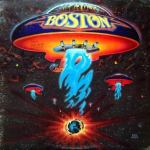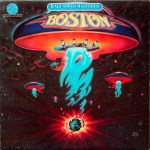More Boston
Hot Stamper Albums with Huge Choruses
- With big, bold, hard-rockin’ Double Plus (A++) sound, this pressing will show you just how good Boston’s debut album can sound
- The multi-tracked, multi-layered guitars are as big as life on this copy and guaranteed to rock your world — on big speakers at loud levels this is a Demo Disc with few peers
- 4 1/2 stars and a Top 100 title: “Nearly every song on Boston’s debut album can still be heard on classic rock radio today due to the strong vocals of Brad Delp and unique guitar sound of Tom Scholz. Boston is essential for any fan of classic rock, and the album marks the re-emergence of the genre in the 1970s.”
- This is clearly Boston’s best sounding album. Roughly 100 other listings for the best sounding album by an artist or group can be found here.
- In our opinion, this is the only Boston record you’ll ever need. Click on this link to see more titles we like to call one and done
Boston’s first (and only good) album is a long-time member of our Top 100, and on a great pressing like this it’s easy to see why. It’s an incredible recording when you can hear it right, and this is about as right as it gets!
It’s obvious why the first Boston album became a Multi-Platinum Record. Practically every one of its songs still gets heavy radio play on every rock station in town. Consummately well-crafted music like this is almost impossible to find nowadays. I guess that’s why they call it Classic Rock.
More Guitar
The multi-tracked layers of guitars really come to life on the better copies. The not-so-great pressings tend to be congested and compressed, thickening the sound and diffusing the layers of multi-tracked harmonies. Tom Scholz’s uniquely overdriven, distorted leads have near-perfect timbre. On the top copies, you can really hear how much power that sound adds to the music.
As is the case for better pressings of Aqualung, when the guitar sounds this good, it really makes you sit up and take notice of the guy’s playing. When the sound works the music works, our seven word definition of a Hot Stamper copy.
Tubey Magical guitar reproduction is superb on the better copies of this recording. Simply phenomenal amounts of Tubey Magic can be heard on every strum, along with richness, body and harmonic coherency that have all but disappeared from modern recordings (and especially from modern remasterings).
Our killer copies have sweetness and tubey warmth we didn’t expect to hear. Better yet, the best copies have jump-out-of-the-speakers presence without being aggressive, no mean feat.
The good ones make you want to turn up the volume; the louder they get the better they sound. Try that with the average copy. When playing mass-market pop-rock music like this, more level usually means only one thing: bloody eardrums.
The typical Boston EQ is radio-friendly, not audiophile-friendly. But some were cut right, with the kind of richness, sweetness and smoothness that we fondly refer to here at Better Records as The Sound of Analog.
Choruses Are Key
The production techniques used on the late Brad Delp’s powerful vocals had to be implemented with the utmost skill and care or they would never have made the album the smash success that it is. His vocals are one of the great strengths of the album. You can be sure the producers and engineers knew that they had a very special singer in Brad and lavished their time and energy on getting his voice just right in the mix, making use of plenty of roomy analog reverb around both his multi-tracked leads and the background harmonies as well.
After hearing plenty of copies, one thing became clear — if the vocals don’t have good presence and breathy texture, you might as well be listening to the radio. Toss it onto the trade-in pile and move on. Brad really belts out those high notes; the right blend of clarity and weight is what lets his soaring vocals work their chart-topping magic.
The richness, sweetness and freedom from artificiality is most apparent on Boston where you most always hear it on a pop record: in the biggest, loudest, densest, most climactic choruses.
We set the playback volume so that the loudest parts of the record are as huge and powerful as they can possibly grow to be without crossing the line into distortion or congestion. On some records, Dark Side of the Moon comes instantly to mind, the guitar solos on “Money” are the loudest thing on the record. On Breakfast in America the sax toward the end of “The Logical Song” is the biggest and loudest sound on the record, louder even than Roger Hodgson’s near-hysterical multi-tracked screaming ‘Who I am’ about three quarters of the way through. Those, however, are clearly exceptions to the rule. Most of the time it’s the final chorus that gets bigger and louder than anything else.


 Many of the worst releases from MoFi in this era were mastered by
Many of the worst releases from MoFi in this era were mastered by 




